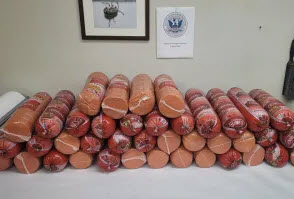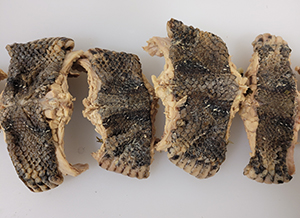A secondary inspection found she had 40 rolls of Mexican bologna, totaling 748 pounds.

CBP photo
“Mexican bologna is a prohibited product because it is made from pork and has the potential for introducing foreign animal diseases to the U.S. pork industry,” the CBP said in a statement.
During that same inspection, CBP ag officers found hundreds of boxes of undeclared medication.
The substances included Alprazolam, which is used to manage panic and anxiety disorders. And Sulfamethoxazole, an antibiotic used to treat different infections.
In a different part of the country in September, a four-legged member of the CBP intercepted a package containing prohibited meat.
Freddie, a four-year-old beagle and member of the Beagle Brigade, sniffed out luggage from Equatorial Guinea at the Washington Dulles International Airport on Sept. 11.
A secondary inspection revealed the luggage contained two pounds of snake meat.

CBP photo
The importer didn’t have the proper permits and documents, making the meat imports illegal and inadmissible.
“All travelers entering the United States are required to declare meats, fruits,” and other products, the CBP’s website says.
This discovery highlights the importance of the CBP in intercepting products that could pose harm to Americans or the U.S. ag industry.
“This seizure exemplifies the extraordinary competence of our Beagle Brigade in protecting our national vital agricultural resources by detecting prohibited plant and animal products packed in traveler baggage,” Marc Calixte, CBP’s area port director for the Area Port of Washington, D.C., said in a statement.